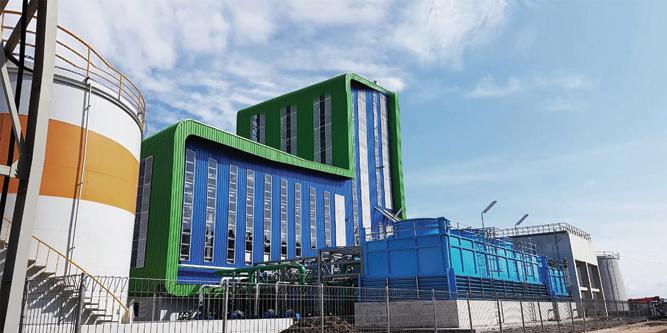
4 minute read
Palm biofuel use may impact exports
Indonesia is forecast to consume over 8M tonnes of palm oil this year to meet domesti c demand for biodiesel, which may hit volumes available for export, the Jakarta Globe reported on 4 February. “Domesti c demand for palm oil in 2020 is esti mated to reach 8.3M tonnes to be processed into biodiesel, which may heavily reduce the amount of palm oil available for export,” Indonesian Palm Oil Associati on (Gapki) executi ve director Mukti Sardjono said.
In January, the government began the mandatory use of B30 (comprising 30% palm biofuel and 70% diesel) and was also aiming to increase this to B40, the Jakarta Globe wrote. The Indonesian Biodiesel Producers Associati on (APROBI) also said the trial use of B40 fuel would start in March, the Jakarta Post reported on 11 February. APROBI chairman MP Tumanggor was reported by kompas.com as saying the new trial was in line with president Joko Widodo’s plan to implement B40 fully in January 2021.
As the world’s top palm oil producer, Indonesia is increasing domesti c use of palm -based biodiesel to decrease dependence on internati onal markets, reduce diesel fuel imports and maintain palm oil prices.
Gapki said expected favourable weather could boost the country’s palm oil output this year. Indonesia’s crude palm oil (CPO) and palm kernel oil (PKO) producti on hit a record 51.8M tonnes last year, up 9.1% from 2018, despite a long drought.
CPO producti on rose 9.4% to 47.2M tonnes and PKO producti on increased 8.6% to 4.6M tonnes in 2019 compared to 2018, Gapki fi gures showed. The country exported 36.2M tonnes of palm oil last year, up 4%, despite the adverse eff ects of the US-China trade war, Indian tariff s and the EU’s palm biodiesel ban.
As a result, CPO prices on the global market had been under pressure since the fi rst half of last year. Gapki esti mated the export value of palm oil products, including oleochemicals and biodiesel, had declined to US$19bn last year, down 17% from US$23bn in 2018.
The decline in export value could have been more severe but CPO prices recovered aft er President Joko Widodo announced that Indonesia would increase domesti c use of CPO for biodiesel, the Jakarta Globe said.
IN BRIEF
SPAIN: Farmers unions are proposing that low quality lampante olive oil should be used as feedstock for biodiesel rather than paying for it to be stored unti l the market improves, the Olive Oil Times reported. The global olive oil market had been disrupted by excepti onally high initi al stocks of oil including last year’s huge yield in Spain, when 1.79M tonnes was produced.
In response, the EU launched a private storage scheme by providing subsidies to operators, Olive Oil Times said. However, the unions said that paying for storage would simply prolong the oversupply problem while using it in biodiesel would solve it. The proposal is to use 600,000 tonnes of olive oil this way.
The Associati on of Renewable Energy Companies of Spain confi rmed the plan’s feasibility provided the process covered the diff erence in price between olive oil and other oils, including soya and palm oil, currently used to produce biodiesel.
ASTM approves new bio-jet fuel pathway
A new sustainable aviati on fuel developed by US research and engineering company Applied Research Associates (ARA) and Chevron Lummus Global (CLG) has been approved by internati onal standards organisati on ASTM Internati onal.
The new producti on pathway, called ‘cata
lyti c hydrothermolysis jet’ (CHJ), was approved on 15 December and published in the revised ASTM specifi cati on for ‘Aviati on Turbine Fuel Containing Synthesised Hydrocarbons’ on 29 January.
ASTM approval will allow the blending of up to 50% of ARA and CLG’s ReadiJet fuel with petroleum-derived jet fuel.
ARA said ReadiJet was produced via the two companies’ Biofuels Isoconversion process, which uti lised hyrdrothermal conversion and hydrotreati ng technology to convert waste fats, oils and greases into jet fuel.
“The Biofuels Isoconversion technology is now set for scale-up in the USA and Japan,” ARA said. “In the USA, multi ple commercial projects are in engineering and Euglena Corporati on is working to start up its integrated Biofuels Isoconversion demonstrati on facility in Japan with the aim of delivering CHJ for commercial fl ights during the 2020 Olympic Games in Tokyo.”
www.ofi magazine.com The Ukrainian Grain Associati on (UGA) has warned that the country could lose its corn and rapeseed exports to Europe due to the lack of greenhouse gas emissions (GHG) reporti ng by producers.
European biofuels regulati ons required the reporti ng of the whole GHG lifecycle on crops desti ned for biofuels producti on including culti vati on, harvesti ng, storage and shipment, APK Inform wrote on 19 February. However, in the Ukraine, almost no reports existed apart from a 2017 GIZ-led study that showed Ukrainian producti on exceeded EU thresholds, parti cularly for corn.
In contrast, competi tors of Ukrainian agricultural producers – such as exporters of rapeseed from Australia and Canada – had already prepared reports on their volume of GHG emissions two years ago, which the European Commission had already approved, APK Inform said. UGA’s executi ve director Serhiy Ivaschenko said if Ukrainian producers wanted conti nued access to the European biofuel market, they would need to reduce their GHG emissions. Ukraine may lose corn, rapeseed exports to EU












